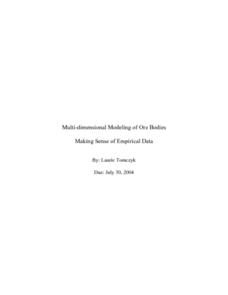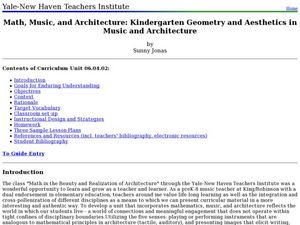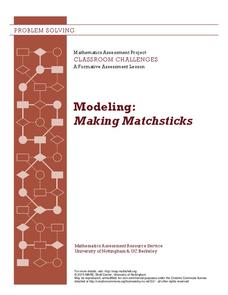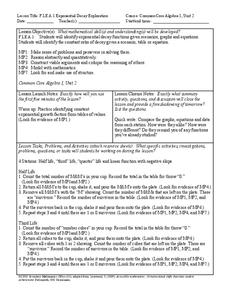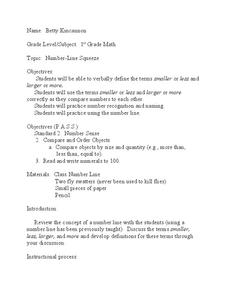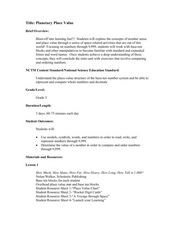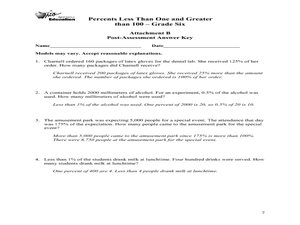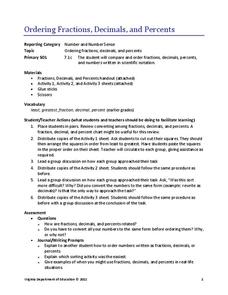EngageNY
Networks and Matrix Arithmetic
Doubling a network or combining two networks is quick and easy when utilizing matrices. Learners continue the network example in the second lesson of this series. They practice adding, subtracting, and multiplying matrices by a scalar...
Statistics Education Web
Saga of Survival (Using Data about Donner Party to Illustrate Descriptive Statistics)
What did gender have to do with the survival rates of the Donner Party? Using comparative box plots, classes compare the ages of the survivors and nonsurvivors. Using the same method, individuals make conclusions about the...
Curated OER
Multi-dimensional Modeling of Ore Bodies Making Sense of Empirical Data
Math scholars identify four different rock types in that strata and use this identification and data to construct a two dimensional geologic cross-section. They use data tables to construct a three-dimensional geologic cross-section.
Curated OER
Sea and Learn - Lesson Plan: A Day at the Dockyard
Learners illustrate and practice number bonds to 5, 10 and 20. They participate in short warm-up games and then advance to the task related to solving with number bonds. Many strategies of calculation are utilized to help the students...
Curated OER
Touch
Students discover how sense of touch helps us explore our world by feeling it and learning the size, texture and shape of things.
Curated OER
Math, Music and Architecture: Kindergarten Geometry and Aesthetics in Music and Architecture
Students identify and name different geometrical shapes. In this math instructional activity, students distinguish odd from even numbers. They describe the properties of 2 and 3 dimensional objects.
Curated OER
Applied Science - Science and Math Pre Lab
Students explore human senses. In this applied Science lesson, students utilize their senses to distinguish various objects. Students explain their descriptions.
Curated OER
Do Touch!
Students explore the sense of touch. They investigate unknown solids using the sense of touch. Pupils use their senses of touch to match feely gloves. Students explore body parts, by tracing their hands and feet on paper. They create a...
Mathematics Assessment Project
Matching Situations, Graphs and Linear Equations
What do guitars, candles, and helicopters have in common? They're all in this resource. Learners complete an assessment task to determine the amount of profit made in a guitar class based on given information regarding variable...
Statistics Education Web
I Always Feel Like Somebody's Watching Me
Future statisticians and potential psychics first conduct an experiment to collect data on whether a person can tell if someone is staring at them. Statistical methods, such as hypothesis testing, chi-square tests, binomial tests, and...
EngageNY
TASC Transition Curriculum: Workshop 8
Lights, camera, action! Math educators consider how to improve their instruction by examining a model of the five-practice problem-solving model involving a movie theater. Participants examine cognitive demand in relation to problem...
Mathematics Assessment Project
Modeling: Making Matchsticks
Math: The only subject where the solution to a problem is seven million matches. Young scholars first complete an assessment task estimating the number of matches they can make from a tree of given dimensions. They then evaluate provided...
Howard County Schools
Exponential Decay Exploration
How can you model exponential decay? Explore different situations involving exponential decay functions and decreasing linear functions by performing activities with MandM candy, popcorn kernels, and number cubes.
Illustrative Mathematics
Christina's Candies
Help Christina figure out how many chocolate and lemon candies she has with a lesson on decomposing numbers. When presenting this context to the class, the teacher chooses the total number of candies and the number that are chocolate,...
Curated OER
Touch Math
Using the touch math system, learners engage in activities to practice adding numbers. While the lesson is laid out in an explicit manner, there isn't a guide explaining the touch math system.
Curated OER
Number-Line Squeeze
First graders investigate numerals and size by ranking different numbers based upon value. For this number sense lesson, 1st graders practice using the terms smaller, larger, less and more in order to organize numbers on a number line....
Curated OER
Mystery Number
Students explore numbers 1-100. In this cross curriculum literacy and numeration instructional activity, students listen to the book More or Less by Stuart J. Murphy. Students play a game with a partner in which they guess the...
Curated OER
It's Not All Greek to Me
Learners find out the meaning for prefixes used in math vocabulary. By dissecting words used in everyday math, they figure out what the prefix indicates and what the word means. A variety of well-organized worksheets and activities...
Curated OER
Planetary Place Value
Third graders explore place value to the ten thousands place. This incredibly thorough, 24-page lesson has learners construct, order, and compare numbers to 9,999. This three-day lesson includes reteaching and extension activities...
Curated OER
Percents Less Than One and Greater Than 100
Sixth graders express numbers as percents greater than 100 and less than one. In this lesson on percents, 6th graders work in groups with real life scenarios to develop an understanding on percentages greater than 100 and less than one....
Curated OER
Once Upon A Math Story
Learners write a math story. In this math operations and writing lesson, students work in small groups to brainstorm ideas for a math story, write a rough draft, revise their story, edit their story and add clip art. Learners...
Curated OER
Math computation
The lesson says it is intended for 4th grade but it is suitable for grades 1-3 as well. The class discusses what it means to add, the commutative property of addition, and mathematical reasoning. This is an exercise in number sense,...
Virginia Department of Education
Ordering Fractions, Decimals, and Percents
Order up a resource on comparing rational numbers. Scholars order fractions, decimals, and percents by converting to a single form. They conduct a cut-and-paste activity ordering three sets of rational numbers.
Curated OER
Number Line Locomotion
Here is a great lesson that incorporates movement into academic learning. Students improve addition subtraction skills by using number lines and locomotor movement.


